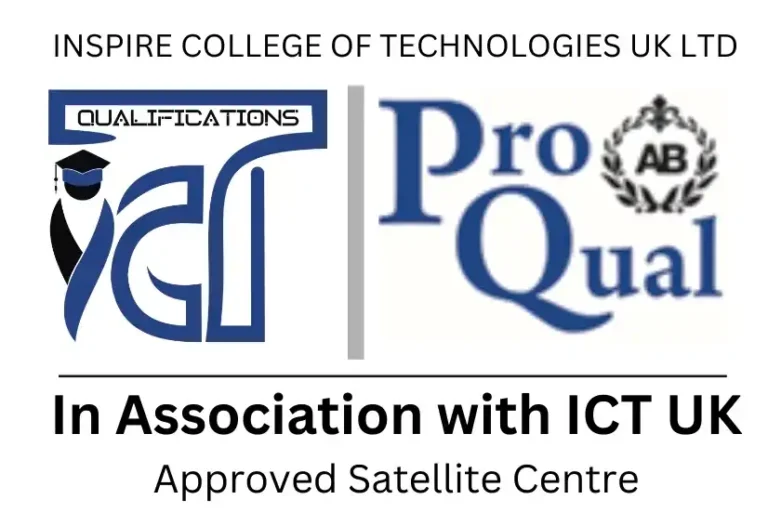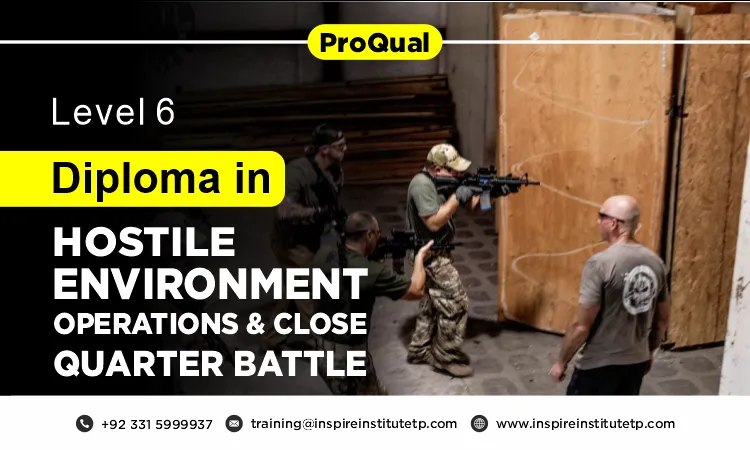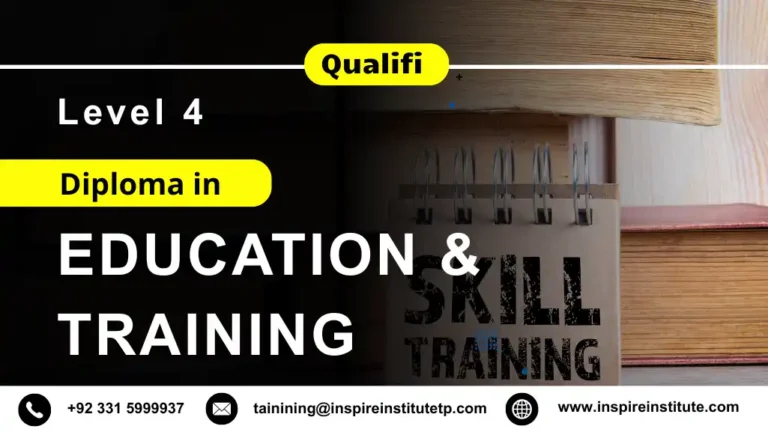ProQual Level 6 Diploma in Hostile Environment Operations & Close Quarter Battle
The ProQual Level 6 Diploma in Hostile Environment Operations and Close Quarter Battle is an advanced qualification designed for professionals who operate in high-risk and unpredictable environments. This comprehensive program equips participants with the critical skills and knowledge necessary to ensure their safety and effectiveness in situations where traditional practices may not suffice.Participants are assessed through a combination of practical evaluations, written assignments, and scenario-based exercises, ensuring a comprehensive understanding of both theoretical concepts and practical applications.Graduates of the ProQual Level 6 Diploma in Hostile Environment Operations and Close Quarter Battle are well-prepared for a range of roles, including security manager, risk assessment consultant, operations coordinator, and team leader in high-stakes environments.The ProQual Level 6 Diploma in Hostile Environment Operations and Close Quarter Battle offers a vital pathway for professionals aiming to excel in demanding roles. With its rigorous curriculum, practical training, and focus on critical skills, this diploma prepares individuals to operate effectively and safely in some of the most challenging environments. For those committed to enhancing their expertise and career prospects, this qualification is an essential step forward.
Why Choose this Qualification
The ProQual Level 6 Diploma in Hostile Environment Operations and Close Quarter Battle is designed for a variety of professionals, including:
- Security Personnel: Individuals working in security roles who need to develop expertise in managing risks and operational strategies in high-threat environments.
- Humanitarian Aid Workers: Professionals involved in delivering aid in conflict zones or unstable regions, requiring specialized training to ensure their safety and effectiveness.
- Law Enforcement Officers: Police and tactical response teams looking to enhance their skills in crisis management and tactical engagement.
- Military Personnel: Active duty or reserve members who want to refine their close quarter battle techniques and operational readiness.
- Emergency Responders: First responders, paramedics, and rescue teams seeking to improve their capabilities in handling emergencies in hostile settings.
- Project Managers: Those overseeing projects in high-risk areas, needing skills to navigate complex environments and implement safety protocols.
- Individuals Seeking Career Advancement: Professionals looking to specialize in hostile environments and CQB tactics to enhance their employability and career prospects.
This course is ideal for anyone aiming to gain comprehensive knowledge and practical skills necessary for operating safely and effectively in challenging and high-risk situations.
Course Overview
Ofqual Regulated Qualification
Course Level: Level 6
Average Completion Time:
6-18 Months
Mandatory Units: Complete one Mandatory Units
Evidence & Assignment Based

Inspire Institute of Technologies is Approved Satellite Centre of ProQual
Qualification Structure
The ProQual Level 6 Diploma in Hostile Environment Operations & Close Quarter Battle, achieve the qualification candidates must achieve all of the mandatory units:
Mandatory Units
| Unit Title | Unit Level |
| Engaging in close quarter battle in a hostile environment | 6 |
Who Should Take This Course
The ProQual Level 6 Diploma in Hostile Environment Operations & Close Quarter Battle is tailored for a variety of professionals working in high-risk environments. Here’s a breakdown of who should consider enrolling in this course:
Security Personnel
- Private Security Contractors: Individuals working in the private security sector needing specialized training for hostile situations.
- Close Protection Officers: Professionals responsible for the safety of individuals in dangerous environments.
Military and Law Enforcement
- Active Military Personnel: Members of the armed forces seeking to enhance their operational effectiveness in hostile conditions.
- Law Enforcement Officers: Police and other law enforcement agents who may encounter high-risk scenarios in their duties.
Humanitarian and NGO Workers
- Humanitarian Aid Workers: Those involved in international aid who operate in unstable or conflict-affected regions.
- Non-Governmental Organization (NGO) Staff: Professionals working for NGOs that require skills in risk assessment and management in hostile settings.
Individuals Seeking Career Advancement
- Aspiring Security Professionals: Individuals aiming to build a career in security management or operations in challenging environments.
- Tactical Response Teams: Members of teams who need advanced training in close-quarters combat and operational strategies.
Risk Management Professionals
- Crisis Management Specialists: Those focusing on developing and implementing strategies for risk mitigation in high-threat scenarios.
This diploma is essential for anyone dedicated to enhancing their safety and operational skills in challenging and potentially dangerous environments.
Course Benefits
The ProQual Level 6 Diploma in Hostile Environment Operations & Close Quarter Battle offers numerous advantages for professionals operating in high-risk environments. Here are some key benefits:
Enhanced Skills and Knowledge
- Comprehensive Training: Gain in-depth understanding of hostile environment operations, including risk assessment and tactical response strategies.
- Specialized Techniques: Learn close-quarter battle techniques that are crucial for effective engagement in confined spaces.
Career Advancement
- Recognized Qualification: Obtain a nationally recognized diploma that demonstrates your expertise and commitment to professional development.
- Increased Employability: Stand out in the job market with a qualification that is valued by employers in security, military, and humanitarian sectors.
Practical Application
- Real-World Scenarios: Engage in practical exercises and simulations that prepare you for real-life situations in hostile environments.
- Operational Effectiveness: Develop skills that enhance your ability to operate safely and effectively in challenging conditions.
Networking Opportunities
- Professional Connections: Meet and collaborate with industry professionals, expanding your network in the security and defense sectors.
- Knowledge Sharing: Participate in discussions and training with peers who have diverse experiences and insights.
Improved Safety Awareness
- Risk Management Skills: Learn to identify and mitigate risks effectively, ensuring your safety and that of others in high-threat situations.
- Crisis Response Preparedness: Prepare for emergencies with training focused on crisis management and rapid response techniques.
Flexibility in Learning
- Varied Learning Formats: Access flexible learning options, including online and in-person courses, to fit your schedule and learning preferences.
By enrolling in the ProQual Level 6 Diploma in Hostile Environment Operations & Close Quarter Battle, you equip yourself with essential skills and knowledge that are crucial for success in high-stakes environments, ultimately enhancing your career trajectory and operational readiness.
Eligibility Criteria
By ensuring these steps are taken, candidates can better prepare for the qualification and maximize their learning experience.
Educational Background:
Candidates should possess a Level 5 qualification in a relevant field, such as security studies, risk management, or a related discipline.
Professional Experience:
Significant work experience in security, military, emergency response, or humanitarian roles is preferred. This experience should demonstrate a familiarity with high-risk environments.
Technical Skills:
A foundational understanding of risk assessment and crisis management practices is advantageous but not mandatory.
Communication Skills:
Strong verbal and written communication skills are essential for effective interaction and collaboration in high-pressure situations.
Commitment to Professional Development:
A demonstrated willingness to engage in ongoing learning and professional growth in the field of hostile environment operations and CQB.
The Qualification Process
Here is a step-by-step guide to help you understand the entire journey from pre-registration to certification:
1. Eligibility Assessment
- Candidates should possess relevant experience in security, military, or related fields. A background in operational roles is beneficial but not always mandatory.
2. Enrollment
- Interested individuals must enroll through an accredited training provider that offers the ProQual Level 6 Diploma. This may involve submitting an application form and paying any associated fees.
3. Course Structure
- The diploma typically consists of several units covering topics such as:
- Risk assessment and management
- Tactical operations and close-quarter battle techniques
- Crisis response strategies
- Legal and ethical considerations in hostile environments
4. Training Delivery
- Courses may be delivered through a combination of:
- Classroom Learning: Engaging lectures and discussions led by experienced instructors.
- Practical Training: Hands-on exercises, simulations, and field training to apply learned concepts in real-world scenarios.
5. Assessment Methods
- Candidates will undergo various assessment methods, including:
- Practical Assessments: Demonstrating skills in simulated hostile environments.
- Written Assignments: Completing coursework that tests theoretical understanding and application of concepts.
- Portfolio Submission: Collecting evidence of skills and knowledge gained throughout the course.
6. Feedback and Support
- Participants will receive ongoing feedback from instructors to help them improve and refine their skills. Support may also be available for portfolio development and preparation for assessments.
7. Certification
- Upon successful completion of all course components and assessments, candidates will be awarded the ProQual Level 6 Diploma in Hostile Environment Operations & Close Quarter Battle.
8. Continuous Professional Development
- Graduates are encouraged to engage in continuous professional development to keep their skills current and stay informed about industry advancements.
By following this structured qualification process, candidates will be well-prepared to operate effectively and safely in hostile environments, equipped with the essential skills and knowledge required for success in their professional roles.







